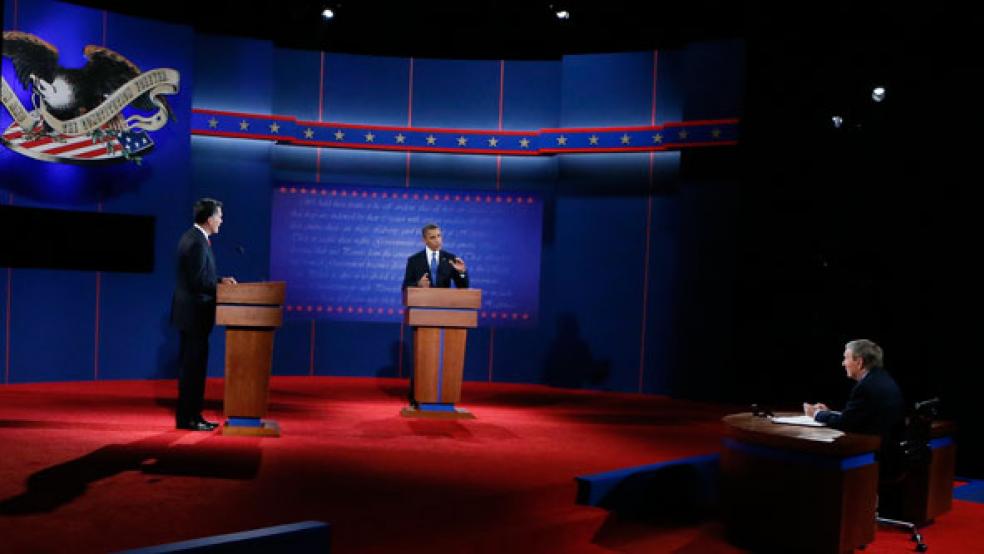As millions tune in tonight to watch what promises to be a verbal slugfest between Democrat Joe Biden and Republican Paul Ryan, veteran PBS newsman Jim Lehrer has some sage advice for tonight’s moderator, Martha Raddatz of ABC News, as well as the other moderators (Candy Crowley and Bob Schieffer). “They should always keep firmly in mind that it is never, EVER about the moderator,” Lehrer told The Fiscal Times on Thursday.
Good advice given the temperament of the two contenders. Ryan, a newbie to the national debate scene, knows his numbers but gets prickly when challenged. Biden, who often talks before he thinks, has had his share of verbal blunders. Gaffes or not, Biden is an emotional, effective persuader. He gesticulates, he intimidates, he points his finger – and he infuriates. Can Ryan, without leaning on his numbers, keep his cool and respond with grace, maturity and sharp wit to derail Biden’s attack Or, will the debate devolve into a brawl?
RELATED: Live! Debate the Biden-Ryan Debate
Lehrer – who has presided over a total of 12 presidential and vice presidential debates in his career, more than any other individual – should know about the dynamics of debates.
Though he took sharp criticism last week for his low-key handling of the first debate between President Obama and GOP challenger Mitt Romney – watched by some 67 million Americans – Lehrer has no real regrets about how things played out in that face-off. He says he hopes that the extended exchanges between the two presidential candidates last week in Denver serve as a model for the other debates this year.
The longtime executive editor of the PBS NewsHour believes the televised debates are about letting the American people see the two people who are competing for the highest offices in the land. Despite the tsunamai of media attention that come their way, moderators, he says, are essentially referees with very low whistles.
“I think the voters of this country deserve to see and hear the candidates challenge and be challenged for what they say and propose,” he told The Fiscal Times.
“Presidential debate history was made on that Denver stage [last week],” Lehrer elaborated. “It was the first time ever that an incumbent president exchanged views face-to-face with his challenger for the whole electorate, if not the world, to witness. However anyone views the end result, it is most likely that it will set the pattern for all such future debates. I certainly hope so, at least.”
There is some strong support for his theory – a theory the Commission on Presidential Debates also stands behind. “Lehrer was actually a model for staying out of the way, and a model that should be emulated,” Steve Schmidt, the chief strategist for Senator John McCain’s 2008 presidential campaign, said recently. “I profoundly disagree with the idea that the lesson from last week is [that] Martha Raddatz needs to be all over the candidates. That’s not her job.”
Raddatz has already come under the media microscope for President Obama’s attendance at her wedding in 1991 to Julius “Jay” Genachowski, who was also a member of the Harvard Law Review. ABC News and other news organizations have vigorously defended her objectivity.
Lehrer told The Fiscal Times, “Even with its imperfections, the open debate course is the way to go. [It] is particularly important in the present world of political campaigns – which, without free-flowing debates, would be limited mostly to canned speeches and packaged television commercials.”
What did he think was missing from the debate last week, which focused on the American economy?
“The open format precluded me from raising other domestic issues that deserved attention – immigration, climate change, gun violence, among others.”
Tonight’s live VP debate (from 9 to 10:30 p.m. EDT) will take place at Centre College in Danville, KY., and have nine distinct time segments of approximately 10 minutes each. “The moderator will ask an opening question, after which each candidate will have two minutes to respond. The moderator will use the balance of the time in the segment for a discussion of the question,” according to the Commission on Presidential Debates.
Raddatz said ahead of tonight’s debate: “I hope it's a forum in 90 minutes where you really do learn more about the total picture of who these candidates are and what difference they want to make. I hope you find some truth in their answers and by them debating one another that you can figure a few things out that maybe you didn’t during the campaign.”
President Obama, meanwhile, in an assessment of his performance in Denver last week, said yesterday that he was “too polite” against his Republican challenger. The latest polls indicate that Mitt Romney has now eliminated the president’s once-dominant lead in the final stretches of the campaign, breaking with long-held wisdom that debates almost never move the needle and adding even more weight to tonight’s VP debate.





